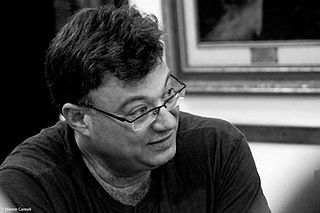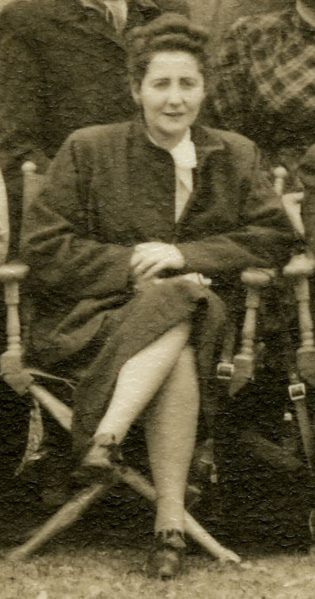Psychoanalysis is a therapeutic method and field of research developed by Sigmund Freud. Founded in the early 1890s, initially in co-operation with Josef Breuer and others' clinical research, he continued to refine and develop theory and practice of psychoanalysis until his death in 1939. It conceptualizes the human psyche as consisting of three primary instances: the id, the ego, and the superego, which interact to satisfy the instinctive needs. Creation and transmission of civilisation serves this biological processes of self-preservation and reproduction.
Psychodynamic psychotherapy and psychoanalytic psychotherapy are two categories of psychological therapies. Their main purpose is revealing the unconscious content of a client's psyche in an effort to alleviate psychic tension, which is inner conflict within the mind that was created in a situation of extreme stress or emotional hardship, often in the state of distress. The terms "psychoanalytic psychotherapy" and "psychodynamic psychotherapy" are often used interchangeably, but a distinction can be made in practice: though psychodynamic psychotherapy largely relies on psychoanalytical theory, it employs substantially shorter treatment periods than traditional psychoanalytical therapies. Psychodynamic psychotherapy is evidence-based; the effectiveness of psychoanalysis and its relationship to facts is disputed.
Theodore Shapiro is a psychiatrist and psychoanalyst in New York, where he is a professor emeritus in psychiatry and pediatrics at Weill Cornell Medical College and the Payne Whitney Psychiatric Clinic. He is a faculty member of the Columbia University Center for Psychoanalytic Training and Research and a training and supervising psychoanalyst at the New York Psychoanalytic Institute.
Child psychotherapy, or mental health interventions for children refers to the psychological treatment of various mental disorders diagnosed in children and adolescents. The therapeutic techniques developed for younger age ranges specialize in prioritizing the relationship between the child and the therapist. The goal of maintaining positive therapist-client relationships is typically achieved using therapeutic conversations and can take place with the client alone, or through engagement with family members.
Interpersonal psychotherapy (IPT) is a brief, attachment-focused psychotherapy that centers on resolving interpersonal problems and achieving symptomatic recovery. IPT is an empirically supported treatment (EST) that follows a highly structured and time-limited approach. Interpersonal therapy is intended to be completed within 12–16 weeks. IPT is based on the principle that relationships and life events impact mood and vice versa. The treatment was developed by Gerald Klerman and Myrna Weissman in order to treat major depression in the 1970s and has since been adapted for other mental disorders. IPT is an empirically validated intervention for depressive disorders and is more effective when used in combination with psychiatric medications.

The Austen Riggs Center is a psychiatric treatment facility located in Stockbridge, Massachusetts. It was founded in 1913 as the Stockbridge Institute for the Study and Treatment of Psychoneuroses by Austen Fox Riggs. The institution was renamed in his honor on July 21, 1919.
Child and adolescent psychiatry is a branch of psychiatry that focuses on the diagnosis, treatment, and prevention of mental disorders in children, adolescents, and their families. It investigates the biopsychosocial factors that influence the development and course of psychiatric disorders and treatment responses to various interventions. Child and adolescent psychiatrists primarily use psychotherapy and/or medication to treat mental disorders in the pediatric population.
Mentalization-based treatment (MBT) is an integrative form of psychotherapy, bringing together aspects of psychodynamic, cognitive-behavioral, systemic and ecological approaches. MBT was developed and manualised by Peter Fonagy and Anthony Bateman, designed for individuals with borderline personality disorder (BPD). Some of these individuals suffer from disorganized attachment and failed to develop a robust mentalization capacity. Fonagy and Bateman define mentalization as the process by which we implicitly and explicitly interpret the actions of oneself and others as meaningful on the basis of intentional mental states. An alternative and simpler definition is "Seeing others from the inside and ourselves from the outside." The object of treatment is that patients with BPD increase their mentalization capacity, which should improve affect regulation, thereby reducing suicidality and self-harm, as well as strengthening interpersonal relationships.

Peter Fonagy, is a Hungarian-born British psychoanalyst and clinical psychologist. He studied clinical psychology at University College London. He is a Professor of Contemporary Psychoanalysis and Developmental Science Head of the Division of Psychology and Language Sciences at University College London and a training and supervising analyst in the British Psycho-Analytical Society in child and adult analysis. His clinical interests center on issues of borderline psychopathology, violence, and early attachment relationships. He was Chief Executive of the Anna Freud Centre in London until September 2024. His work attempts to integrate empirical research with psychoanalytic theory. He has published over 500 papers, and 270 chapters and has authored 19 and edited 17 books.
Supportive psychotherapy is a psychotherapeutic approach that integrates various therapeutic schools such as psychodynamic and cognitive-behavioral, as well as interpersonal conceptual models and techniques.

Daniel S. Schechter is an American and Swiss psychiatrist known for his clinical work and research on intergenerational transmission or "communication" of violent trauma and related psychopathology involving parents and very young children. His published work in this area following the terrorist attacks on the World Trade Center in New York of September 11, 2001 led to a co-edited book entitled "September 11: Trauma and Human Bonds" (2003) and additional original articles with clinical psychologist Susan Coates that were translated into multiple languages and remain among the first accounts of 9/11 related loss and trauma described by mental health professionals who also experienced the attacks and their aftermath Schechter observed that separation anxiety among infants and young children who had either lost or feared loss of their caregivers triggered posttraumatic stress symptoms in the surviving caregivers. These observations validated his prior work on the adverse impact of family violence on the early parent-child relationship, formative social-emotional development and related attachment disturbances involving mutual dysregulation of emotion and arousal. This body of work on trauma and attachment has been cited by prominent authors in the attachment theory, psychological trauma, developmental psychobiology and neuroscience literatures
The mainstay of management of borderline personality disorder is various forms of psychotherapy with medications being found to be of little use.

Panic disorder is a mental and behavioral disorder, specifically an anxiety disorder characterized by reoccurring unexpected panic attacks. Panic attacks are sudden periods of intense fear that may include palpitations, sweating, shaking, shortness of breath, numbness, or a feeling that something terrible is going to happen. The maximum degree of symptoms occurs within minutes. There may be ongoing worries about having further attacks and avoidance of places where attacks have occurred in the past.
Fredric Neal Busch is a Weill Cornell Medical College clinical professor of psychiatry based in New York City. He is also a faculty member at the Columbia University Center for Psychoanalytic Training and Research.
The Coping Cat program is a CBT manual-based and comprehensive treatment program for children from 7 to 13 years old with separation anxiety disorder, social anxiety disorder, generalized anxiety disorder, and/or related anxiety disorders. It was designed by Philip C. Kendall, PhD, ABPP, and colleagues at the Child and Adolescent Anxiety Disorders Clinic at Temple University. A related program called C.A.T. Project is aimed at adolescents aged 14 to 17.
Dr. Allan Abbass is professor, psychiatrist, and founding Director of the Centre for Emotions and Health at Dalhousie University in Halifax, Nova Scotia, Canada.
The Goethe Award for Psychoanalytic and Psychodynamic Scholarship is given annually by the Section on Psychoanalytic and Psychodynamic Psychology of the Canadian Psychological Association. The award is given for the best psychoanalytic book published within the past two years and is juried by a peer review process and awards committee.

Golan Shahar is an Israeli clinical health psychologist and an interdisciplinary stress/psychopathology researcher.

Elisabeth Rozetta Geleerd Loewenstein was a Dutch-American psychoanalyst. Born to an upper-middle-class family in Rotterdam, Geleerd studied psychoanalysis in Vienna, then London, under Anna Freud. Building a career in the United States, she became one of the nation's major practitioners in child and adolescent psychoanalysis throughout the mid-20th century. Geleerd specialized in the psychoanalysis of psychosis, including schizophrenia, and was an influential writer on psychoanalysis in childhood schizophrenia. She was one of the first writers to consider the concept of borderline personality disorder in childhood.
Jacques P. Barber is a French-born, American clinical psychologist and psychotherapy researcher. He is an Emeritus Professor and Dean at the Gordon F. Derner School of Psychology at Adelphi University. He served as Dean from August 2011 until his retirement in August 2023.






